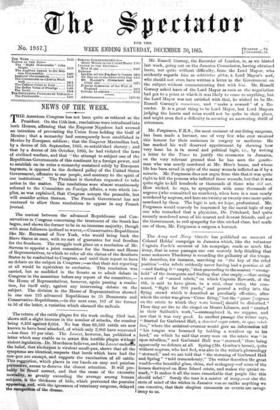The Army and Navy Gazette has published an account of
Colonel Hobbs' campaign in Jamaica which, like the volunteer Captain Forde's account of his campaign, reads so much like irony, that in some passages one can scarcely help thinking that some unknown Thackeray is recording the gallantry of the troops. Ile describes, for instance, marching on " the key of the rebel position"—the rebels evidently never having had a position at all —and finding it " empty," then proceeding to the nearest " strong- hold " of the insurgents and finding that also empty,—then seeing a crowd of "armed rebels," on which Captain Roworth, of the 6th, is said to have given, in a cool, clear voice, the com- mand, " Sight for 900 yards," and poured a volley into the
flying crowd which is described as peculiarly effective, after which the order was given "Cease firing," lest the " game [negroes on the estate to which they were bound] should be disturbed." Then they set fire to the chapel on Mount Libanus, and " exulted in their Sabbath's work,"—oontemplated it, we suppose, and saw that it was very good. In another passage the writer says, " Started for Garbrand Hall, a deserted sugar estate, in open rebel- lion," where the assistant-overseer would give no information till " his tongue was loosened by holding a revolver up to his head," on which he said that every man on the estate was " in open rebellion," and Garbrand Hall was " stormed," there being apparently no defence at all. Spring (Mr. Gordon's house), quite without negroes, who had fled, was also in the writer's phraseology " stormed," and we are told that " the storming of Garbrand Hall and Spring " "told tremendously." The writer describes the great wealth—the beautiful glass, china, and mahogany—of some of the houses destroyed on Ross Island estate, and makes the quaint re- mark, " It makes it all the more remarkable that people like this should rebel." Surely the man is a master of irony,—or else the state of mind of the whites in Jamaica was so unlike anything we can conceive, that their simplest comments on events are savage irony to us.






























